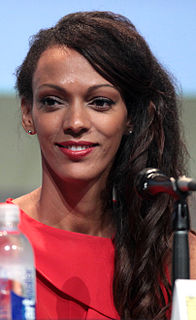A Quote by Charlotte Gainsbourg
With a film you go with the script that's already written. And I've never thought of a project, a film that would come from my own desire. I don't think I can do it. I need someone else's desire to be able to do something. With a record, it is completely different, it's a collaboration with another artist, but I'm willing to go into intimate places with no masks on.
Related Quotes
African films should be thought of as offering as many different points of view as the film of any other different continent. Nobody would say that French film is all European film, or Italian film is all European film. And in the same way that those places have different filmmakers that speak to different issues, all the countries in Africa have that too.
There's something that happens where you go, if you're lucky, goodness me, from film to another film to another film. And you can sort of feel that if you step off that treadmill, it might all go horribly wrong and you might never be employed again, you know. And I suddenly thought that that's not necessarily the case. And I also thought we make drama as actors about people in the world and that if you are on that treadmill, you start making films about other films.
The director [Elfar Adalsteins] came to me through my agent and I had a read of the script [of the "Sailcloth]. I thought immediately this is someone who is writing for the cinema. Not having to go through the tedious business of taking something from literature and making that awful leap that is so difficult to make anyway, from literature to cinema. It's refreshing to be able to deal with a subject like that, to be written where the driving force is the image on screen and you don't need any words. The more that we can do that [in film], the better.
In the case of my second film The Fish Child (El Niño Pez), I had written the novel about 5 years before I made into a film. In the case of The German Doctor I had published the novel a year before I started writing the script, I even had another project to shoot. But I had this idea of the powerful cinematic language from the novel that I couldn't let go of.
If, then, there is some end of the things we do, which we desire for its own sake (everything else being desired for the sake of this), and if we do not choose everything for the sake of something else (for at that rate the process would go on to infinity, so that our desire would be empty and vain), clearly this must be the good and the chief good.
And so you try your best. Sometimes you go in with one thing, with one desire and come out with something else. In the case of 'The Aviator' it was to create a Hollywood spectacle, but by about the second or third week of shooting you just want to literally survive it. Because don't forget, I also go through the editing process too, and when the film is released I have to talk about it. So, I take all of that very seriously.
Desire is something very egoistic. If you desire something, you also have to take the consequences of that. You have to study the market and see how it can go. I mean to become an artist... You never get the Nobel-price for example. You can normally never become a millionaire. Very few become millionaires, so the circumstances are very bad if one becomes an artist. And that should be taken into consideration.
I went to film school when I was 17, and of course when you are very young you think that there is nothing else in the world except film. At some point I started getting hungry to see something else. For five years I didn't make any films, I was traveling around the world, writing for newspapers, working in theater, working in opera, I thought I would never return to film.
So that would be my input and I'd go off and I'd work on another film, and then I'd catch up with them later on in the year. We just kind of nursed the piece along. There was no timeframe. We didn't have anyone pushing us except ourselves to make the film, and a desire. And then the organic kind of naming of Roger; then it happened really fast.
When I start on a film I always have a number of ideas about my project. Then one of them begins to germinate, to sprout, and it is this, which I take and work with. My films come from my need to say a particular thing at a particular time. The beginning of any film for me is this need to express something. It is to make it nurture and grow that I write my script- it is directing it that makes my tree blossom and bear fruit.
Spiritual seeking means knowing this negative part: that desiring is the root cause of frustration. To desire is to create, of one`s own accord, a shell. Desiring is the world. To be worldly is to desire and to go on desiring, never becoming aware that each desire comes to nothing but frustration. Once you become aware of this, then you do not desire, or your only desire is to know what is.



































